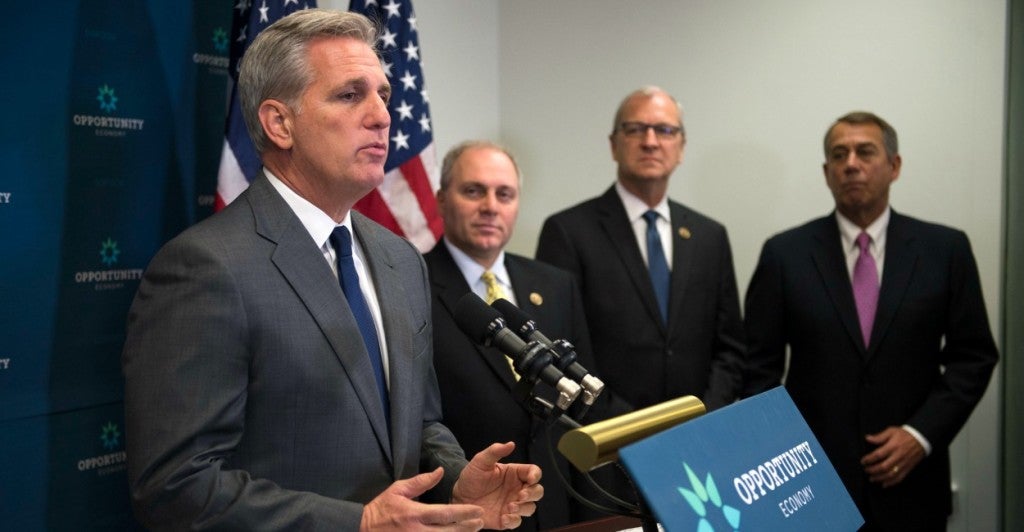The upcoming leadership races should not be driven by personality, quid pro quo committee assignments, and fundraising prowess. Instead, those races should be determined by policy and process.
The complete absence of a conservative agenda by the Republican-controlled Congress must change. In evaluating leadership candidates, members should demand clarity as to how each one would put forward a positive conservative agenda that promotes opportunity for all and favoritism to none. Policies such as higher education reform, entitlement and tax reform, and securing religious liberty are just a few examples. Significant internal rules changes that decentralize power in the House are also important.
In evaluating leadership candidates, members should demand clarity as to how each one would fight the numerous legislative battles that will emerge over the remainder of the year.
Here are 7 near-term issues that members should evaluate the next speaker and his or her leadership team on to begin rebuilding trust:
- Planned Parenthood. Taxpayer funding of abortion giant Planned Parenthood cannot continue. A key test will occur today as outgoing Speaker John Boehner, R-Ohio, plans to use Democrats’ votes to continue the organization’s funding. Those seeking a leadership position should fight his plan using every tool at their disposal.
- Reconciliation. The Republican budget passed, primarily, because leadership and the budget chairmen promised “the use of reconciliation for the sole purpose of repealing the President’s job-killing health care law.” Failure to uphold that promise will jeopardize the likelihood of passing a budget next year. It will also hamper efforts to fully repeal the law in 2017.
- Budget Caps. In 2011, the Republican-controlled House forced President Obama to sign spending caps into law. Those caps have been raised once before, and many suggest they will be raised once more, in an effort dubbed Ryan-Murray 2.0. A near-term spending increase would further undermine the party’s claim to fiscal responsibility.
- Debt Ceiling. The debt ceiling is a legitimate tool to control spending and enact major pillars of the GOP budget. The next GOP leadership team must pledge to use that tool. Additionally, they should pledge to tie the debt ceiling to an actual number, as opposed to a date change that hides the true cost of such actions.
- Export-Import Bank. The new leadership team must promise to keep the Export-Import Bank shuttered and limit its funding to ensure that it conducts only activities necessary to winding down. Additionally, the next speaker and his or her leadership team must stop any attempt to resurrect the bank, which has been closed for 92 days.
- Highway Bailout. According to the Department of Transportation, the federal Highway Trust Fund currently has more resources than previously projected, and should have plenty of funding to continue operating well into next year. The next GOP leadership team must ensure that the Oct. 29 reauthorization deadline is not used as an excuse to pass a massive extension and expansion of federal highway funding.
- No Child Left Behind. House Republicans rightly criticized the Senate’s reauthorization of No Child Left Behind. There is no reason for the House to proceed to a conference with such a bill.
The opportunity for a change in leadership should empower rank-and-file lawmakers.
The Republican-controlled House should embrace this as an opportunity to align itself with the conservative grassroots and increase the likelihood that the party will actually fight for conservative policy priorities. That will not happen through inertia. It will take a concerted effort to ensure the meaning of the moment is not lost.
No one should need an army of lawyers, lobbyists, and accountants to succeed in this great nation.
We have a chance to take back America, but it will require the Republican Party to fight for all Americans, not the powerful and well-connected.
